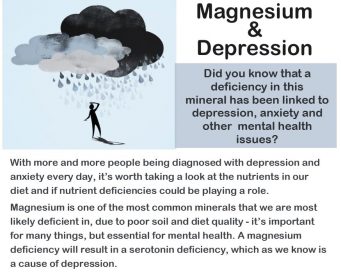Magnesium is very important in mood regulation and has an impact on your nervous system. It is necessary for most functions in our bodies. However, up to half of the population is magnesium deficient. Magnesium deficiency has been directly linked to depression and anxiety.
The onset of depression has greatly increased in incidence, and it is affecting people much earlier in their lives during the late 20th century and early 21st century than before the 20th century (Meyer and Quenzar, 2005). The reasons for these findings are not quite clear, but inadequate dietary Mg is prevalent in America and is the most likely cause. There is probably a real increase in depression, coupled with a change in diagnostic habits, which has to do with the element of stigma. Lower stigma leads to a higher rate of diagnosis.
Magnesium is very important in mood regulation and has an impact on your nervous system and magnesium deficiency has been linked to depression and anxiety.Magnesium deficiency causes N-methyl-D-aspartate (NMDA) coupled calcium channels to be biased towards opening which causes neuronal injury and neurological dysfunction, which we believe results in MD. Oral administration of Mg to animals produced antidepressant-like effects that were comparable to those of antidepressant drugs. Cerebral spinal fluid (CSF) Mg has been found to be low in suicidal TRD. The first report of Mg treatment for agitated depression was published in 1921 showing success in 220 out of 250 cases







Stefan Lang –
Aqua Römer Classic ist perfekt für alle, die sprudelndes Wasser mögen. Es hat einen angenehmen Geschmack und die Kohlensäure ist gut dosiert.